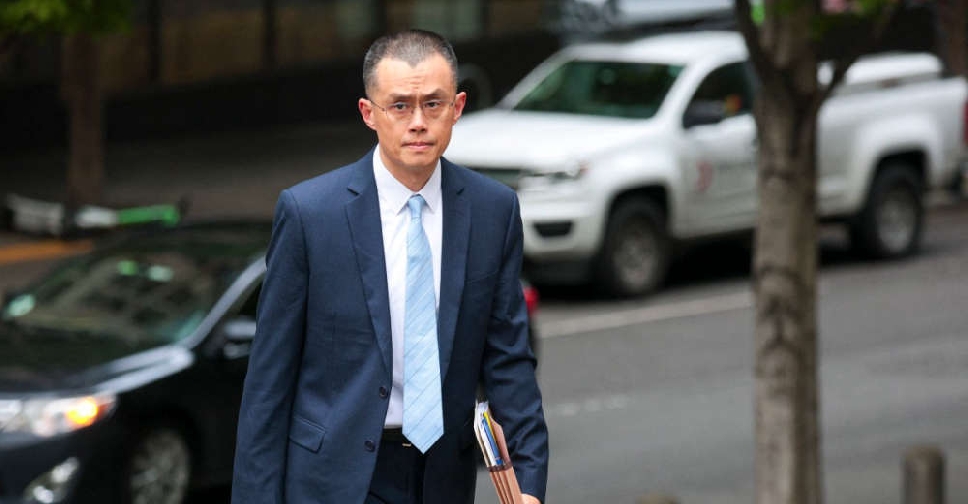
Changpeng Zhao, the former chief executive of Binance has been sentenced to four months in prison after pleading guilty to violating US laws against money laundering at the world's largest cryptocurrency exchange.
Once considered the most powerful crypto industry figure, Zhao, known as "CZ," is the second major crypto boss to be sentenced to prison.
The sentence imposed by US District Judge Richard Jones in Seattle was significantly shorter than the three years sought by prosecutors, and below the maximum 1-1/2 years recommended under federal guidelines.
It was also much lighter than the 25 years behind bars that Sam Bankman-Fried received in March for stealing $8 billion from customers of his now-bankrupt FTX exchange. Bankman-Fried is appealing his conviction and sentence.
Prosecutors cheered the outcome of what had been a years-long investigation into Binance and Zhao, a billionaire who had been living beyond US reach in the United Arab Emirates.
"This was an epic day,” US Attorney Tessa Gorman told reporters outside the courthouse. “Incarceration was critical in this case and we’re pleased with the result.”
Before handing down the sentence, Jones faulted Zhao for making Binance's growth and profitability a higher priority than complying with US laws.
"You had the wherewithal, the finance capabilities, and the people power to make sure that every single regulation had to be complied with, and so you failed at that opportunity," he said.
Zhao, 47, did not visibly react upon hearing his sentence.
He wore a navy blue suit and tie in the courtroom, with his mother and several other family members in attendance. Defense lawyers had requested probation.
"'Crime pays' is the message sent today," Dennis Kelleher, head of the financial reform advocacy group Better Markets, wrote in an email, noting Zhao will still get to keep his vast wealth.
Prosecutors said Binance employed a "Wild West" model that welcomed criminals, and did not report more than 100,000 suspicious transactions with designated terrorist groups including Hamas, al-Qaeda and Islamic State.
They also said Zhao's exchange supported the sale of child sexual abuse materials and received a large portion of ransomware proceeds.
Binance agreed to a $4.32 billion penalty, and Zhao paid a $50 million criminal fine plus $50 million to the US Commodity Futures Trading Commission.
"I'm sorry," Zhao told the judge before being sentenced.
"I believe the first step of taking responsibility is to fully recognise the mistakes. Here I failed to implement an adequate anti-money laundering program ... I realise now the seriousness of that mistake."
Zhao will surrender voluntarily to serve his sentence, most likely at a detention center near Seattle-Tacoma International Airport.
“Not prioritising compliance is a few shades below criminal intent. It’s bad, but it’s below the usual requirement of specific intent" that would justify a years-long sentence, said Robert Frenchman, a lawyer specialising in white-collar crime. But given the scale of Binance’s violations and the massive fines imposed, he should not have expected probation or home detention, Frenchman added.
Prosecutors had told the judge a tough sentence would send a clear signal to other would-be criminals. "We are not suggesting that Mr. Zhao is Sam Bankman-Fried or that he is a monster," prosecutor Kevin Mosley said.
But Zhao's conduct, he said, "wasn't a mistake. This wasn't a regulatory 'oops.'"
Zhao stepped down as Binance's chief in November, when he and the exchange he founded in 2017 admitted to evading money-laundering requirements under the Bank Secrecy Act.
In seeking probation, defense lawyers said others who admitted to similar wrongdoing, including BitMEX founder Arthur Hayes, were not locked up.
Zhao "wanted to make a difference in the world," but made mistakes, defense lawyer Mark Bartlett said.
Jones said the three-year sentence requested by prosecutors was inappropriate because they did not show that Zhao knew in advance about illegal activity.
"It's always the case the government asks for more than they think they'll get," said Frenchman. "Going that much above guidelines for a pleader is unusually aggressive."
Several other crypto moguls are also in the crosshairs of US authorities after the collapse of crypto prices in 2022 exposed fraud and misconduct across the industry.

 UAE, India, Sri Lanka sign deal to develop Sri Lanka into energy hub
UAE, India, Sri Lanka sign deal to develop Sri Lanka into energy hub
 EU seeks unity in first strike back at Trump tariffs
EU seeks unity in first strike back at Trump tariffs
 UK's Jaguar Land Rover to halt US shipments over tariffs
UK's Jaguar Land Rover to halt US shipments over tariffs
 US starts collecting Trump's new 10% tariff
US starts collecting Trump's new 10% tariff
 Nasdaq set to confirm bear market as Trump tariffs trigger recession fears
Nasdaq set to confirm bear market as Trump tariffs trigger recession fears




